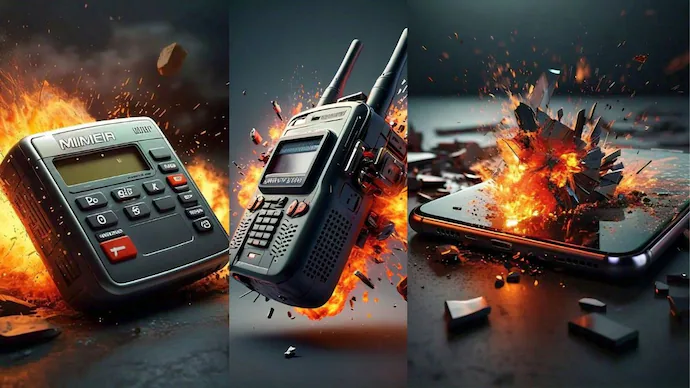INTRODUCTION
In September 2024, Hezbollah faced one of the most significant tactical blows in its history through what is now referred to as the “Pager and Walkie-Talkie Attack.” The incident involved the detonation of thousands of pagers and walkie-talkies, which Hezbollah had begun using earlier in the year to protect its communications from Israeli intelligence surveillance. The devices exploded simultaneously across southern Lebanon, wreaking havoc on Hezbollah’s infrastructure and operations. This unprecedented attack, believed to be a sophisticated covert operation orchestrated by Israeli intelligence, dramatically shifted the dynamics of the Hezbollah-Israel conflict.
Background of Hezbollah’s Communication Strategy
For years, Hezbollah’s leaders were concerned about the growing capabilities of Israeli surveillance, which could intercept and decode their digital communications. In early 2024, Hezbollah’s Secretary-General Hassan Nasrallah ordered a tactical shift to older, seemingly safer technologies—pagers and walkie-talkies. These devices were chosen due to their perceived invulnerability to advanced Israeli cyber espionage tools. By reverting to these low-tech methods, Hezbollah hoped to avoid the risks associated with smartphones and encrypted communication apps that had proven to be vulnerable to interception by Israel’s intelligence apparatus.
Shift from Smartphones to Pagers
Hezbollah’s decision to switch from smartphones to pagers was seen as a strategic move to evade Israeli eavesdropping. Hezbollah believed that by moving away from more advanced and monitored communication technologies, they could reduce the chances of Israeli intelligence penetrating their networks. Nasrallah’s directive was clear: only use pagers and short-range radio communications (walkie-talkies) to transmit sensitive information. This shift was aimed at safeguarding Hezbollah’s communication lines, which were critical for its ongoing military operations against Israel.
Covert Operation: Explosive Tampering of Pagers and Walkie-Talkies
The attack on Hezbollah’s communications infrastructure in September 2024 revealed a new level of sophistication in modern covert operations. Intelligence sources suggested that Hezbollah’s pagers and walkie-talkies had been tampered with during the manufacturing process or during transit. The devices were sabotaged to include explosives, which could be remotely triggered. This allowed the attackers to coordinate a widespread and devastating strike on Hezbollah’s operational capabilities.
The exact method of how these explosives were integrated into the devices remains unclear. However, experts believe that Israeli intelligence agencies may have infiltrated Hezbollah’s supply chain, either by planting agents in the factories or intercepting shipments during transportation. This possibility highlights the far-reaching capabilities of Israeli intelligence in disrupting Hezbollah’s infrastructure.
The Attack: September 2024 Covert Strike
The “Pager and Walkie-Talkie Attack” occurred over two days, on September 17 and 18, 2024. The first wave of explosions targeted Hezbollah’s pagers across its strongholds in the southern suburbs of Beirut, southern Lebanon, and the Beqaa Valley near the Syrian border. These areas have long been under Hezbollah control, and the pagers were primarily used by Hezbollah’s mid-level commanders to coordinate activities with operatives on the ground.
The second wave of attacks, on September 18, targeted the organization’s walkie-talkies. These explosions caused further chaos, aggravating the already confused state of Hezbollah’s leadership. The precision and coordination of the explosions indicated that this was not an isolated event but a meticulously planned and executed operation.
Casualties and Damage Assessment
The human cost of the attack was severe. Lebanese hospitals were overwhelmed with over 3,000 injured and at least 37 confirmed deaths. Many of the casualties were Hezbollah operatives, though some civilians were also affected, especially in densely populated areas like the southern suburbs of Beirut. The destruction of communication equipment and the disarray it caused in Hezbollah’s ranks left the organization unable to mount an immediate response, both in terms of mitigating damage and retaliating against Israel.
The attack did not only claim lives but also paralyzed Hezbollah’s ability to coordinate further operations. The destruction of its communication systems blinded the organization, creating an unprecedented level of operational disruption.
Israeli Involvement: Was Mossad Behind It?
While Israel has not officially claimed responsibility for the Pager and Walkie-Talkie Attack, the scale and sophistication of the operation strongly suggest Israeli involvement. Experts have drawn comparisons between this attack and previous covert operations attributed to Mossad, Israel’s intelligence agency, including the 2010 Stuxnet cyberattack on Iran’s nuclear facilities and the assassinations of key Hezbollah figures over the years.
The simultaneous detonation of thousands of devices, combined with the technical knowledge required to insert explosives into communication equipment, aligns with Israel’s pattern of using covert operations to weaken its adversaries. By disrupting Hezbollah’s communication infrastructure, Israel has once again demonstrated its ability to neutralize threats without engaging in open warfare.
Strategic Consequences for Hezbollah
The strategic fallout for Hezbollah from the Pager and Walkie-Talkie Attack cannot be understated. In the immediate aftermath, Hezbollah’s ability to carry out its operations was severely crippled. The loss of its communication network left Hezbollah leaders without the means to coordinate their military activities, both within Lebanon and across the border into Israel.
Beyond the immediate operational impact, this attack raises long-term concerns for Hezbollah. The organization must now contend with the reality that its communication methods, once thought to be secure, can be penetrated and weaponized by Israeli intelligence. This will likely force Hezbollah to rethink its approach to securing its communication systems.
Broader Implications for the Hezbollah-Israel Conflict
The attack also has broader implications for the ongoing Hezbollah-Israel conflict. Tensions between the two sides have been rising steadily since late 2023, when Hezbollah began supporting Hamas in its renewed conflict with Israel. The Pager and Walkie-Talkie Attack, which Hezbollah has labeled an “act of war,” threatens to escalate the conflict to new levels. Hezbollah’s leadership has promised retaliation, though the organization’s current communication crisis may hamper its ability to carry out effective operations in the short term.
The Role of Technology in Modern Warfare
The Pager and Walkie-Talkie Attack underscores a critical point about modern warfare: while digital technologies and cyberwarfare often dominate the headlines, older, less sophisticated technologies can still play a significant role in contemporary conflicts. Hezbollah’s decision to revert to pagers and walkie-talkies, and the subsequent sabotage of those devices, highlights the need for robust communication security in warfare, regardless of the technology used.
This incident demonstrates that no communication system is entirely secure, especially when facing an opponent with the resources and expertise of Israeli intelligence. The successful weaponization of these devices serves as a stark reminder that even low-tech solutions can be vulnerable to sophisticated infiltration.
Security Lessons from the Attack
For military organizations and insurgent groups like Hezbollah, the attack highlights several critical lessons about communication security. First, the incident proves that reverting to older technologies does not guarantee safety from interception or sabotage. Second, it emphasizes the importance of securing the entire supply chain, from manufacturing to deployment, as any point of vulnerability can be exploited.
For nation-states, the attack signals that covert operations continue to be an effective way of destabilizing adversaries without engaging in conventional warfare. The ability to cripple an enemy’s infrastructure through remote sabotage offers a potent tool in modern intelligence operations.
Hezbollah’s Response and Potential Retaliation
In the wake of the attack, Hezbollah has publicly vowed to retaliate against Israel, calling the incident an “act of aggression.” However, with its communication networks severely compromised, Hezbollah may face significant challenges in coordinating a coherent response. The organization’s leadership has been forced to re-evaluate its operational capabilities, and any retaliation may be delayed as Hezbollah scrambles to rebuild its communication infrastructure.
Future Directions for Hezbollah and Israeli Conflict
Looking ahead, it remains to be seen how this attack will shape the future of the Hezbollah-Israel conflict. The incident has undoubtedly weakened Hezbollah in the short term, but the organization has proven resilient in the past. As Hezbollah works to restore its communication capabilities, Israel will likely continue to press its advantage, potentially carrying out further covert strikes.
At the same time, the attack could push Hezbollah into adopting even more advanced communication technologies or, alternatively, force them to return to more traditional, in-person methods of coordination, which are far less susceptible to interception.
Broader Middle Eastern Dynamics
The repercussions of the Pager and Walkie-Talkie Attack extend beyond Hezbollah and Israel, affecting the broader Middle Eastern geopolitical landscape. Lebanon’s fragile political situation, combined with Hezbollah’s entrenchment within the country, means that any escalation of conflict with Israel could have devastating consequences for the entire region. Moreover, Hezbollah’s close ties to Iran and Syria add another layer of complexity, as these regional actors may be drawn into the conflict.
Conclusion: A Turning Point in Covert Warfare
The Pager and Walkie-Talkie Attack represents a significant turning point in the ongoing conflict between Hezbollah and Israel. The use of covert operations to weaponize seemingly innocuous communication devices demonstrates the evolving nature of warfare in the 21st century. As the conflict continues to unfold, both sides will need to adapt to the changing landscape of modern intelligence and military operations.
The broader implications of this attack will likely resonate throughout the region, influencing not only Hezbollah’s strategy but also the tactics employed by other insurgent groups and state actors. As covert warfare becomes an increasingly prominent feature of modern conflicts, the lessons from this attack will be crucial for military planners and intelligence agencies worldwide.
FAQs
- What was the “Pager and Walkie-Talkie Attack”?
- It was a covert operation in September 2024 where thousands of Hezbollah’s pagers and walkie-talkies were rigged with explosives, causing significant casualties and disrupting the organization’s communications.
- Who is believed to be behind the attack?
- While Israel has not officially claimed responsibility, the operation bears the hallmarks of Israeli intelligence, drawing comparisons to previous Mossad covert actions.
- Why did Hezbollah switch to pagers and walkie-talkies?
- Hezbollah switched from smartphones to pagers and walkie-talkies in 2024 to avoid Israeli surveillance, believing these low-tech devices would be less susceptible to interception.
- What were the consequences for Hezbollah?
- The attack resulted in at least 37 deaths and over 3,000 injuries, as well as significant operational disruption due to the loss of communication channels.
- How has the attack affected the Hezbollah-Israel conflict?
- The attack has escalated tensions between Hezbollah and Israel, with Hezbollah calling it an “act of war” and vowing retaliation, which could lead to further conflict in the region.
- What does the attack signify for modern warfare?
- The attack highlights the evolving nature of warfare, where even outdated technologies like pagers can be weaponized in sophisticated covert operations.

